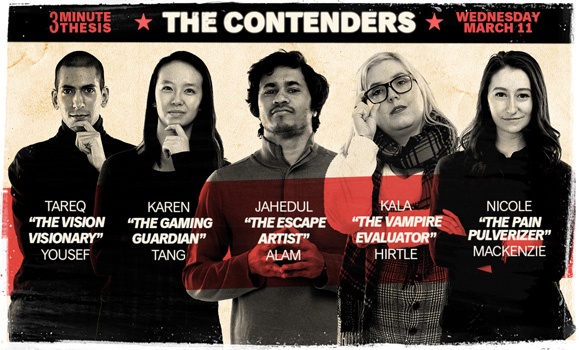It’s time for Dalhousie’s royal rumble of intellectual rigor: 3 Minute Thesis. The yearly competition gives graduate students from across the university a platform to share the intricacies of their research with the public and compete for $4,000 in cash prizes.
But there’s a catch. They only get 180 seconds and one PowerPoint slide to make their pitch.
From Oceanography to Agriculture, Musicology to Medicine, master’s and PhD students will illuminate their ideas in the punchiest way possible. It’s a chance for the Halifax community to discover the groundbreaking research Dal graduate students are conducting — before it changes the world.
With CBC reporter Brett Ruskin as the event’s MC, the final round of the event will take place March 11th at 6:30 p.m. in the Student Union Building’s McInnes Ballroom, after a day of heats on March 10th. Last year, more than 200 people turned out to cheer on the challengers at the finals, and more than 10,000 watched their presentations via social media.
(RSVP for this year's event on Facebook.)
To provide a sneak preview of the heavy-hitting research that will be on display, we sought out five "Contenders" — a small cross-section sampling of the 85 outstading researchers who've entered this year's competition — to see what 3MT is all about.
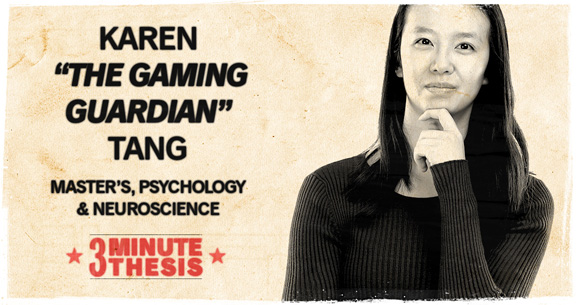 Pressing pause on video game addiction
Pressing pause on video game addiction
Karen “The Gaming Guardian” Tang
Describe your research
Many of us know people who spend too much time playing videogames, but we still don’t know with certainty the factors that lead to video game addiction. By examining attachment style and emotion dysregulation, both of which are developed in childhood and widely studied in substance abuse research, I aim to help crack that gaming addiction code.
What’s one takeaway you want the audience to remember?
Gaming disorder is a very real and diagnosable condition. In 2018, the World Health Organization added gaming disorder to the International Classification of Diseases. Gamers should be cognizant of their gaming habits because the addiction is very real.
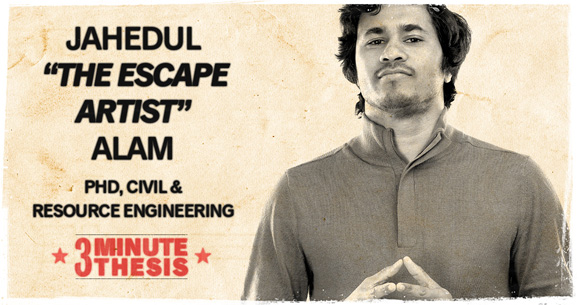 Putting efficiency into evacuation
Putting efficiency into evacuation
Jahedul “The Escape Artist” Alam
Describe your research
My research focuses on evacuation planning to save lives from the destruction of natural disasters. I’m modelling what traffic would look like in Halifax during a mandatory evacuation order for a major hurricane. I address when to depart, which route to take, where to go and how to ensure the safety of vulnerable populations, by using advanced traffic simulations. I want to give decisionmakers the information they need, before catastrophe strikes.
What’s one takeaway you want the audience to remember?
Our network is vulnerable. According to my model, it would take 22 hours to evacuate the Halifax peninsula. We only have five exit points – two bridges, two highways and one rotary, and in a flood, the rotary is unlikely to be usable. 22 hours is a long time. My research recommends strategies to move people safely during extreme events.
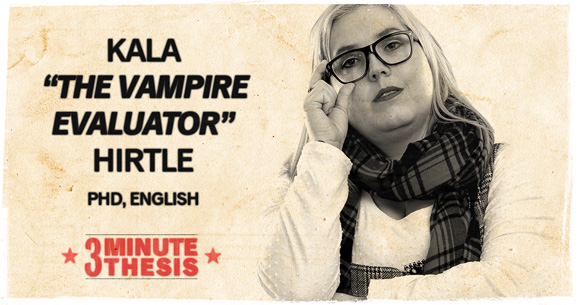 Exploring our deepest fears through the farthest fetched
Exploring our deepest fears through the farthest fetched
Kala “The Vampire Evaluator” Hirtle
Describe your research
In my research, I argue that the portrayal of vampires in 19th century fiction changes as a consequence of medical innovations that transformed our idea of consciousness. In 1846, chemical anesthesia was used for the first time. People were frightened by what might happen to their soul when they’re put into this altered state, and we see writers grappling with this fear in vampire fiction. Their characters began to sleepwalk, acting without volition. This idea was controversial because it meant that something other than God could control our body.
What’s one takeaway you want the audience to remember?
We can learn a lot about ourselves by looking at how our writers reflect our fears back to us. It’s important to pay attention to what we read and consume in terms of popular media. It’s these places where we try to make sense of what’s happening in the world. Sometimes it’s an escape, but sometimes it’s where we see our biggest battles taking place.
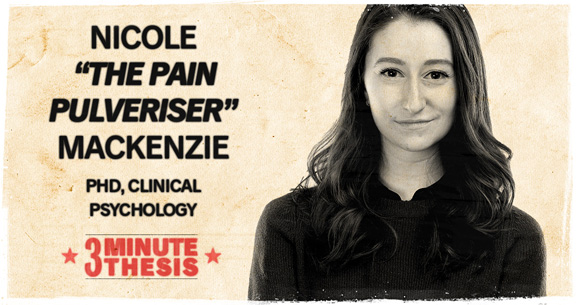 Taking the sting out of childhood vaccinations
Taking the sting out of childhood vaccinations
Nicole “The Pain Pulveriser” MacKenzie
Describe your research
Vaccinations are a source of pain for kids and distress for their parents. We have strategies to manage this pain that science has proven to be effective – from distraction, to breast feeding to topical anesthetic – but parents don’t know where to look for them. They’re published in journals or obscured by scientific jargon. My research is focused on how to get this information to the parents who need it.
What’s one takeaway you want the audience to remember?
We know that fear of pain can be a factor that causes parents to hesitate before vaccinating their children. By more effectively communicating ways pain can be managed, we can hopefully have a positive effect on vaccination rates. Families are the ultimate beneficiaries of this research. Hopefully it will lead to kids who stick to regular vaccine schedules and better health for the rest of their lives.
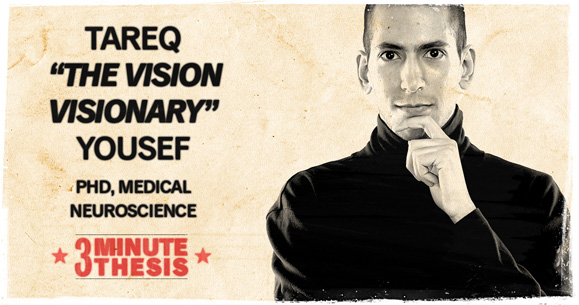 Illuminating the science of sight
Illuminating the science of sight
Tareq “The Vision Visionary” Yousef
Describe your research
I am trying to understand how our eye teases apart changing levels of light. People often think that the eye is like a camera that sends pictures to the brain. But that’s not what happens. The retina at the back of the eye does a lot of work to understand the different features of our visual world. I’m studying the processes that allow us, among other things, to see the same detail by candlelight that we can in bright sunlight.
What’s one takeaway you want the audience to remember?
To develop the technology we need to help people with visual impairments, we need to understand how our biology works in order to mimic it. My research is a step in that direction. I’m exploring how our eyes perceive changes in light to help build up the foundation of what we know about how we see the world. Hopefully, it will someday help bring light to people who otherwise would experience the world in darkness.

